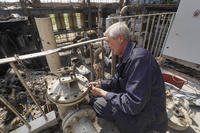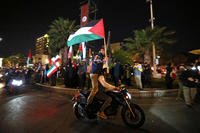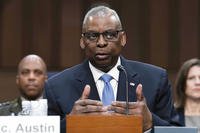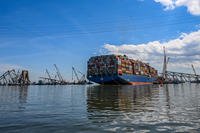Could 9/11 happen another time? I'm not talking in general about another surprise terrorist attack in the States. Literally, could a group of jihadists "board four airplanes, subdue their passengers, and fly the planes right over the heads of the nation's leaders, right past the ferocious firepower of the U.S. military, just as they did five years ago?" That's the provacative question Defense Tech contributor Shane Harris asks in the current National Journal. He examines the 9/11 plot, step-by-step, and looks at which ones could -- and couldn't -- still be pulled off today. Bottom line: There have been improvements. But it just could happen, all over again.
That's the provacative question Defense Tech contributor Shane Harris asks in the current National Journal. He examines the 9/11 plot, step-by-step, and looks at which ones could -- and couldn't -- still be pulled off today. Bottom line: There have been improvements. But it just could happen, all over again.
Then: Months before he piloted American Airlines Flight 11 into the north tower of the World Trade Center, Mohamed Atta had come to the attention of U.S. authorities. In January 2001, he persuaded an inspector with the Immigration and Naturalization Service to let him into the country so that he could continue pilot training at a U.S. school, even though he presented no student visa.
Now: ...stricter regulations for issuing student visas are in place. Any foreigner entering the United States on a student visa must be registered in a government computer system. However, the schools themselves have generally been responsible for entering the data, and have borne the burden of alerting federal officials when students don't show up for classes. In that case, federal officials are supposed to track them down. In August, several Egyptian students who were granted visas to attend a summer program in Montana never showed up at their assigned school, and the FBI launched a nationwide manhunt to apprehend them...
Then: Early on the morning of September 11, Mohamed Atta and a fellow hijacker flew from Portland, Maine, to Boston's Logan Airport, where the two men were to board American Airlines Flight 11 bound for Los Angeles. When Atta checked in at Portland, the government's Computer Assisted Passenger Prescreening System flagged him for additional inspection, which consisted of holding Atta's checked bags off the aircraft until it was confirmed that he was aboard...
Now: CAPPS has undergone at least three iterations. The Transportation Security Administration is trying to launch the Secure Flight System to screen airline passengers. But deployment has been beset by delays, management problems, and unresolved concerns about how the system would protect passenger privacy. The current screening system, which relies on antiquated technologies, has kept some suspicious passengers off planes, officials say, but not all of them. The system has also flagged individuals who were clearly not terrorists, calling into question its efficacy...
Then: All of [the Boston-based hijackers] walked through metal detectors set up to react to items with at least the metallic content of a .22-caliber handgun.
Now: Metal detectors have been recalibrated to react to smaller metal objects.
Then: If any one of them had set off the detector, he would have been screened by hand using a more sensitive, metal-detecting wand.
Now: Passengers who trip the metal detectors are patted down by a TSA screener.
Then: Also, the hijackers' bags were run through an X-ray machine to examine their contents; nothing suspicious was found.
Now: TSA screeners have color monitors that help them distinguish objects of different density, which can help the screeners find explosives. But the machines do not detect explosives. Screeners can search for trace explosives using separate equipment...
Surely, would-be terrorists could enter the country legally, and presumably they have done so. When actually boarding flights, however, they would face increased scrutiny... Any attempted hijacking would be met with potentially lethal resistance from passengers. This may be the single best insurance that another 9/11 couldn't happen -- at least, not the same way.








